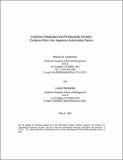Inventory Reduction and Productivity Growth: Evidence from the Japanese Automotive Sector
| dc.contributor.author | Lieberman, Marvin B. | |
| dc.contributor.author | Demeester, Lieven | |
| dc.date.accessioned | 2002-09-10T19:04:18Z | |
| dc.date.available | 2002-09-10T19:04:18Z | |
| dc.date.issued | 2002-09-10T19:04:18Z | |
| dc.identifier.uri | http://hdl.handle.net/1721.1/1643 | |
| dc.description.abstract | The literature on JIT production suggests a causal link between work-in-process inventory and manufacturing productivity. Such a connection has been described in numerous case studies but never tested statistically. This paper uses historical data for 52 Japanese automotive companies to evaluate the inventory-productivity relationship. We find that inventory reductions stimulated gains in productivity, rather than vice versa. On average, each 10% reduction in inventory led to about a 1% gain in labor productivity, with a lag of about one year. Significant differences are found among company groups: Toyota affiliates had a shorter lag; while Nissan affiliates demonstrated no productivity effect. Firms that made inventory reductions typically saw an increase in their productivity rank. | en |
| dc.format.extent | 45598 bytes | |
| dc.format.mimetype | application/pdf | |
| dc.language.iso | en_US | |
| dc.subject | Inventory | en |
| dc.subject | Productivity | en |
| dc.subject | Just-In-Time Manufacturing | en |
| dc.subject | Auto Industry | en |
| dc.subject | Japan | en |
| dc.subject | Empirical Study | en |
| dc.title | Inventory Reduction and Productivity Growth: Evidence from the Japanese Automotive Sector | en |
Files in this item
This item appears in the following Collection(s)
-
International Motor Vehicle Program
Research on automotive industry dynamics from assembly to the extended enterprise, from e-business to sustainability
